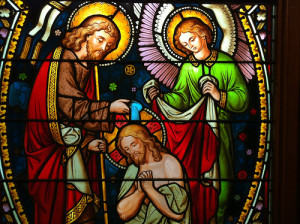A few weeks ago I ran short on time and couldn’t address the following passage in my sermon. It’s a mysterious bit of teaching about Elijah that can leave us scratching our heads.
And they asked him, “Why do the scribes say that first Elijah must come?” And he said to them, “Elijah does come first to restore all things. And how is it written of the Son of Man that he should suffer many things and be treated with contempt? But I tell you that Elijah has come, and they did to him whatever they pleased, as it is written of him.” (Mark 9:11-13)
Let’s put together some clues from scripture:
2 Kings 2:11
And Elijah went up by a whirlwind into heaven.
Elijah was an important prophet who never died, but was taken into heaven in a whirlwind.
Malachi 4:1-6
“Surely the day is coming; it will burn like a furnace. All the arrogant and every evildoer will be stubble, and the day that is coming will set them on fire,” says the Lord Almighty. “Not a root or a branch will be left to them. But for you who revere my name, the sun of righteousness will rise with healing in its rays. And you will go out and frolic like well-fed calves. Then you will trample on the wicked; they will be ashes under the soles of your feet on the day when I act,” says the Lord Almighty.
“Remember the law of my servant Moses, the decrees and laws I gave him at Horeb for all Israel.
“See, I will send the prophet Elijah to you before that great and dreadful day of the Lord comes. He will turn the hearts of the parents to their children, and the hearts of the children to their parents; or else I will come and strike the land with total destruction.”
Long after Elijah was taken up in the whirlwind, and long before Mark 9, God issued this prophecy that Elijah would come back in a ministry of restoration preceding a horrific day of wrath.
Luke 1:13-17
But the angel said to him, “Do not be afraid, Zechariah, for your prayer has been heard, and your wife Elizabeth will bear you a son, and you shall call his name John. And you will have joy and gladness, and many will rejoice at his birth, for he will be great before the Lord. And he must not drink wine or strong drink, and he will be filled with the Holy Spirit, even from his mother’s womb. And he will turn many of the children of Israel to the Lord their God, and he will go before him in the spirit and power of Elijah, to turn the hearts of the fathers to the children, and the disobedient to the wisdom of the just, to make ready for the Lord a people prepared.”
When the angel informed Zechariah that John the Baptist would be born, he used language similar to Malachi 4, stating the John would minister “in the spirit and power of Elijah”.
John 1:19-23
And this is the testimony of John, when the Jews sent priests and Levites from Jerusalem to ask him, “Who are you?” He confessed, and did not deny, but confessed, “I am not the Christ.” And they asked him, “What then? Are you Elijah?” He said, “I am not.” “Are you the Prophet?” And he answered, “No.” So they said to him, “Who are you? We need to give an answer to those who sent us. What do you say about yourself?” He said, “I am the voice of one crying out in the wilderness, ‘Make straight the way of the Lord,’ as the prophet Isaiah said.”
During his baptizing ministry, John stated that he was not Elijah, but used another prophecy from Isaiah to explain his forerunning ministry.
Matthew 11:11-15
For all the Prophets and the Law prophesied until John, and if you are willing to accept it, he is Elijah who is to come. He who has ears to hear, let him hear.
Jesus stated that John was Elijah, but the saying is mysterious. First, because he says John is Elijah who is to come, pointing toward the future. Second, because only those with “ears to hear” could understand what Jesus meant.
Matthew 17:10-13
And the disciples asked him, “Then why do the scribes say that first Elijah must come?” He answered, “Elijah does come, and he will restore all things. But I tell you that Elijah has already come, and they did not recognize him, but did to him whatever they pleased. So also the Son of Man will certainly suffer at their hands.” Then the disciples understood that he was speaking to them of John the Baptist.
In Matthew’s account of the post-transfiguration conversation, Jesus says that Elijah will come (future) and has already come (past). The disciples understood that he was referring to John the Baptist.
So, from all these scriptures, we put together:
- In some way, the same Elijah of long ago was prophesied to return, preceding a day of wrath.
- John the Baptist has something to do with it. He ministered in Elijah’s spirit and power.
- John said that he was not Elijah. Jesus said that John was Elijah. We should take Jesus’ testimony over John’s. Perhaps John didn’t know he was Elijah.
- Jesus also said that there was more “Elijah” to come in the future.
All this may point to two forerunning ministries for Elijah: the first corresponded with Jesus’ incarnation; the second will correspond to Jesus’ return.
However, because scripture does not explain this clearly and does not emphasize it, we should not be dogmatic or overly fascinated with it. What we can know is that God has for a long time been setting the stage for the final act when Jesus will come “in the glory of his Father with the holy angels” (Mark 8:38).






